In the 20th Century progressive campaigns emerged in the British establishment, promising soaring freedoms. This first in a series explores what happened when these campaigns hit reality: and they delivered us instead to a bleak, unbounded void. ‘Nothingism’, rather than Progressivism.
MPs vote this Friday 20th June on a proposal to make this campaign reality. Please write to your MP if you are concerned about this bill. It takes 1 minute.
This is a story of men, as by the time we meet them, most of the women involved are already dead.
Warning for some content on suicide and violent homicide.
The man who killed from ‘kindness’
In January 1980 a 79 year old woman called Christina Hunter died in Dundee. Her husband - a retired police officer - had subjected her to a dreadful, sustained violent assault. She had been married to her husband for 40 years, had grown up children with him, but had been suffering from ‘senility’ (what we’d probably now call dementia) for several years. Her husband Robert had been caring for her - he’d ‘had to take over the complete running of the house’. Press reported that Christina had been wandering from their old folks flat, that her behaviour had become ‘challenging’ or ‘aggressive’, and that Robert Hunter had been told it was time for his wife to go into a care home.
Instead, he killed her. His use of an axe, a hammer and a ligature is what criminologists would now call ‘overkill’. Hunter had ‘no remorse’ for this act: in fact he said himself “I knew what I was doing and it was in cold blood. I am glad that she is dead. I have put her out of her misery”. Nonetheless the Crown decided to drop the charge brought against Hunter from murder to one of culpable homicide (our Scottish equivalent of manslaughter) because of a medical opinion that he was suffering from diminished responsibility. The judge who eventually sentenced him said “I cannot put from my mind the appalling manner in which you brought about her death”.
Violent killings excused with kindness are now commonplace
Much of the system’s response to Robert Hunter became the norm: now, up to one British man every month kills a woman who was not terminally ill nor asking to die, instead elderly, infirm, disabled. The killing is seemingly triggered by escalating care needs: sometimes it is time for her to need to go into a home. The violence used to kill can be extreme, ‘overkill’. The men are prosecuted but usually allowed to plead guilty to manslaughter by diminished responsibility.
Again, and again, and again, it is said to be an act of mercy, of kindness, for the best:
Much of this relentless consistency is the work of one man.
The man who worked to liberate the mercy killers
Three weeks after Robert Hunter was sentenced to prison in Edinburgh, a London-based campaigner wrote to The Scotsman. Nicholas Reed was a Labour Councillor, former Oxford don, and led his campaigning organisation ‘EXIT’ from a mansion in ‘Kensington’ (really Pimlico). EXIT were serious about delivering their aims: their board had included luminaries of politics, media and sciences, and at least one doctor and lawyer. Their Chairman was past chair of the Liberals and patron of the trans rights campaign group Press for Change (which was to win significant change of its own over the decades to follow). EXIT were very well connected indeed. EXIT’s main objective was lawful euthanasia for those with incurable illnesses - with the help of doctors - through repeal of the 1961 Suicide Act which made it a crime to assist a suicide. Under Reed it also pursued other projects in this vein. His second project for EXIT was the plight of men like Robert Hunter.
In June 1980 Reed wrote in aid of:
“Mr Robert Hunter of Dundee, who ended the life of his wife in what was clearly a compassionate case of a mercy-killing… This is the first time in 4 years that anyone found guilty of this offence has actually been sentenced to prison. In 12 other cases the sentence has always been 2 years probation, or conditional discharge… EXIT intends to see that Mr Hunter is released as soon as possible.”
It worked. Six months later Hunter was back in court in Edinburgh. Spurred into action, his defence solicitor argued that “the disapproval of the community would be amply conveyed by a shorter sentence”. The Court of Criminal Appeal agreed and Robert Hunter was released.
But Nicholas Reed was himself about to go to prison.
A Man From Exit Called to Kill Me
A few weeks after Nicholas Reed wrote glibly of Robert Hunter’s ‘compassion’, the Daily Express reported on a shocking police investigation. Nicholas Reed and another man were being investigated for being involved in the deaths of 250 people. London detectives had set up a ‘special euthanasia squad’ to investigate.
All 250 dead were EXIT members, and the London Coroner involved in the police investigation reported that many of the deaths would not previously have come to the attention of coroners.
Reed had been identified only because of his ambition: he had invited ITV to film his organisation as they published a suicide manual called ‘The Guide to Self Deliverance’. The ITV film crew heard about the suspicious suicide of a London woman with multiple sclerosis, Hetty Crystal, and attended the inquest. Astonishingly, it turned out that the strange man who had attended Hetty before her death from an overdose was someone the documentary team had already met via Reed: Mark Lyons.
Lyons was identified from the team’s photographs by two women at the inquest. They were from a building society and had been at Mrs Crystal’s house to write out cheques the day she died and were there when Lyons arrived…Ironically it was Reed’s own obsession for publicity which led to the discovery. He sent the television team to interview the relative of the first person Lyons helped to die. The Times, October 31st 1981
So it all unfolded. Lyons had kept meticulous diaries. Reed and Lyons were prosecuted, Lyons initially for the murder of Hetty Crystal and both for the involvement in the deaths of 7 people and a further 2 people who did not die. The charges were brought under the 1961 suicide act (and its 14 year prison sentence) that Reed and EXIT had campaigned to undo.
A devilish creature
As many of the deaths described in Lyons close scripted exercise book diaries had not been noticed as suspicious at the time, the evidence of two people added significant force to the prosecution case. They had both decided at the last not to die.
It turned out that Lyons- the 69 year old janitor who worked in the basement of EXIT’s offices - had been the henchman in an operation led by Reed. Telephone callers to EXIT would be triaged by Reed, sometimes by his meeting them in person. If he decided they should die, they would next be visited by Lyons. Reed initially claimed in court that this was to ‘comfort’ the victims. But Lyons would really be armed with his ‘suicide kit’ of gloves, plastic bags and drugs, ready to seek his fee.
One was a woman who had called EXIT in distress at her spinal injury and osteoarthritis as ‘I didn’t want to be a burden to anyone’. But after speaking with another woman, she realised that she didn’t want to die and called EXIT to tell them so.
Ignoring this, Lyons travelled to her home, rang her doorbell, told her “you are not going to pull through” and gave her two violent options for death: he would force feed her pills and suffocate her with a plastic bag, or he would hold her head underwater in the bath. She gave evidence from a stretcher in court on his rage at her mind change: “I had tears in my eyes, I thought ‘this man has come to kill me’...now he was a devilish creature”.
Tapes played in court had Lyons on the phone, in his retelling “you bloody stupid bitch". There will be no questioning of my commandment, none at all”.
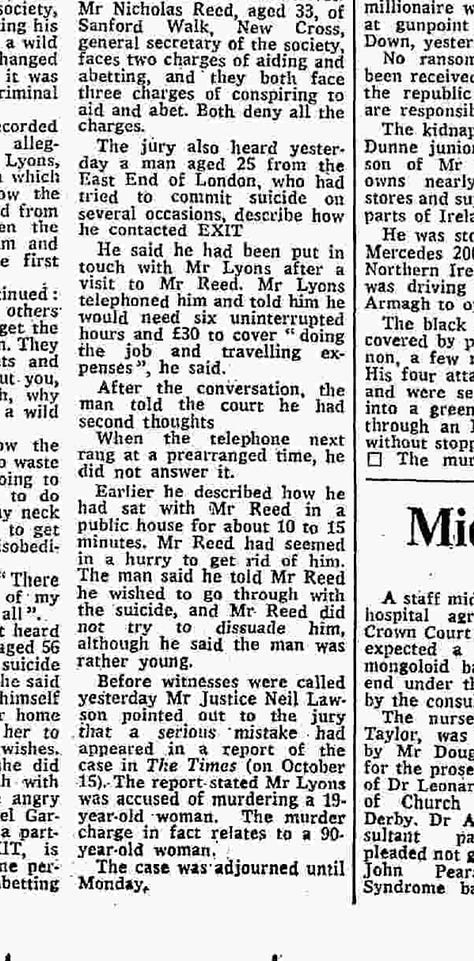
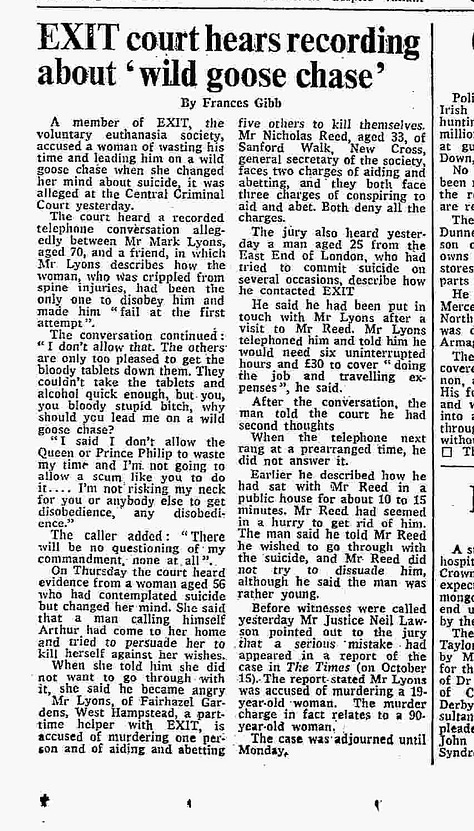
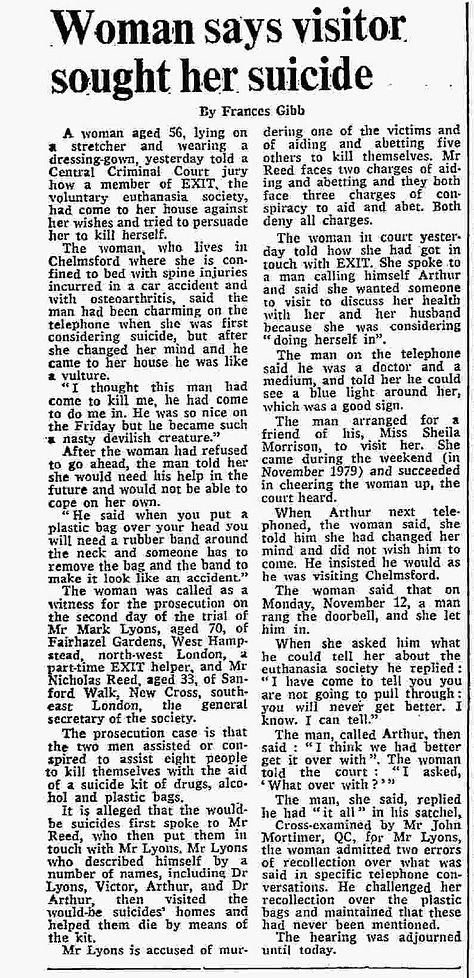
Next to give evidence in court was a 25 year old man. He had suffered psychiatric issues since serving in the army and had attempted suicide several times before. Nicholas Reed met him in a pub for about 10 or 15 minutes and “seemed in a hurry to get rid of him”. Reed told the man he was “rather young”. Nonetheless Reed put Mark Lyons in touch, who told the man by telephone that he would need £30 to cover Lyon’s expenses. The man had second thoughts, and did not answer when the telephone next rang to arrange his death.
In the end, Reed was convicted in 3 cases, Lyons in 6. The people whose cases they were convicted in - mostly women- had fibromyalgia, multiples sclerosis, agoraphobia, and depression. Two had cancer. Reed and Lyons were cleared of charges for mum who had spinal injury, and a man who had had respiratory disabilities. Reed was sentenced to 2.5 years in prison. Lyons given “the traditional penalty for euthanasia”: a suspended sentence.
And so Reed’s third project, a criminal killing enterprise, was closed.
A Woman Takes Over, Rejoicing
Barbara Smoker, South London based campaigner on a host of liberal and progressive causes took over as Chair. She said on Reed’s sentencing, of the woman with agoraphobia who died:
She was not terminally ill and her death could have been averted…In the other cases, although I can't condone one of our officers breaking the law, the fact that these people died a little quicker I find a matter for rejoicing,"
"His compassion got the better of him”.
But that same week that Reed was being sentenced, Barbara Smoker was herself in court. Her 67 year old lodger, a man who was not an EXIT member, died by suicide after suffering depression. She feared that this looked suspicious, and told the coroner that “People we want to help in EXIT are terminally ill”, one week after the conviction of the organisation’s General Secretary and Janitor for the deaths of people who were not, in fact, terminally ill.
This determination that EXIT’s projects could be bounded by sheer willing was among the major weaknesses of the campaign.
Having opened the door, who walked through?
A fourth project for EXIT under Reed had been the publication of the suicide manual: The Guide to Self Deliverance. This found EXIT in court over the early 1980s and roiled by internal conflict. You can watch this in the ITV documentary where Reed browbeats the EXIT executive committee ahead of publication.
The manual was to be safeguarded with a requirement that new members of EXIT must wait 3 months before receiving the manual, and must be aged over 25. Membership ballooned from 2000 to 9000 and it seems to have attracted little self-reflection that most of these members were older women.
Here is Reed learning that the ITV crew (key to Reed’s eventual imprisonment) got ahold of a copy of the manual. EXIT’s safeguard that members could only acquire the book failed instantly when the crew asked an EXIT member for a copy.
Inevitably and almost immediately, the manual was used by people who were outside EXIT’s grand vision. The EXIT Chairman Lord Beaumont resigned when a 22 year old man died in Claridges hotel - EXIT’s age safeguard having failed. But once published the book could not be stopped from taking its merciless toll. In the 1980s, local papers provided a stream of headlines of the types of suicides our society now fights hard to prevent: women fearful of dependency in older age or ground down by caring responsibilities and bereavements, longtime sufferers of depression, a man with schizophrenia


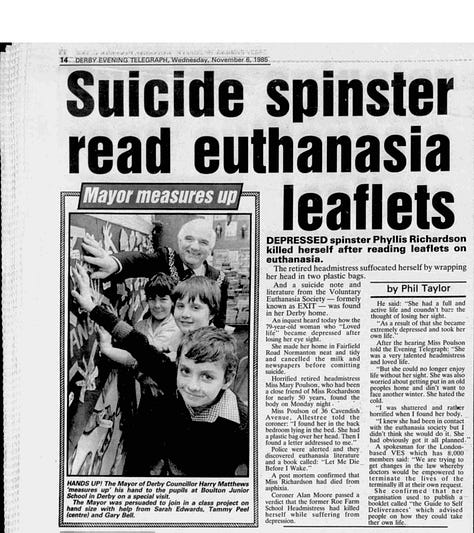

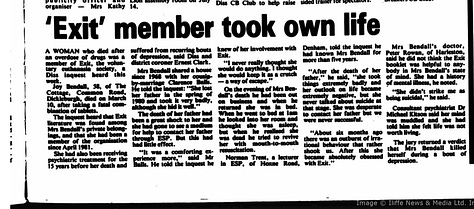


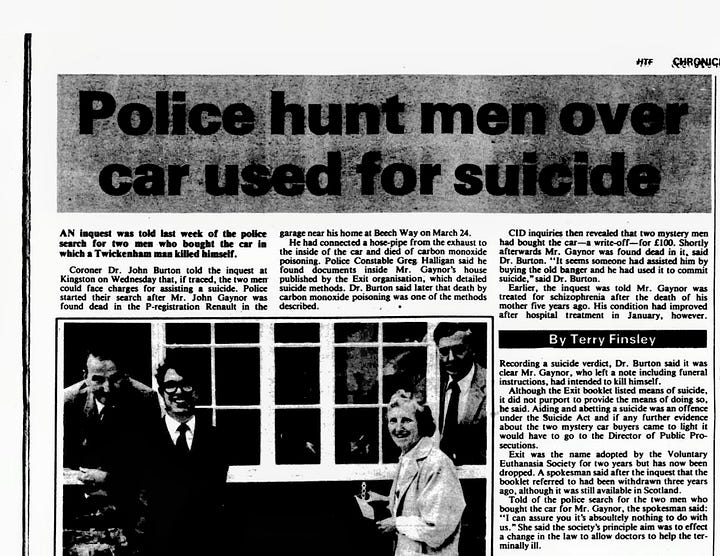
It’s hard not to think that EXIT would have seen coroners as a foe.
How does an organisation move on?
‘I can assure you it’s absolutely nothing to do with us’ Voluntary Euthanasia Society spokesperson responding to the news that a man with schizophrenia using the suicide manual to die.
EXIT under Nicholas Reed pursued four projects: to undo the Suicide Act and bring freedom through euthanasia to the public, to free the mercy killers, to provide a criminal death service for Britain, and to publish instructions for suicide. Under new leadership, the death service was dropped and the suicide manual withdrawn from sale (although as we saw, its harms continued for years and years).
EXIT rebranded quickly after Reed’s imprisonment, first to the Voluntary Euthanasia Society (its longtime name) and then to Dignity in Dying in the 2000s. It maintained renewed focus on the terminally ill, although as the 1980s continued that seemed to include a wide range of disabilities like multiple sclerosis, and people who’d suffered a stroke.
Dignity in Dying still campaigns to free the mercy killers, even violent men, as we found in November. There is no suggestion that Dignity in Dying is engaging in unlawful behaviour today. When asked by The Telegraph to comment on The Other Half’s last report, a spokesman said: “Dignity in Dying is a professional campaigning organisation working within the law to change the law. No one working in our organisation today was working on these issues in the 1970s or 1980s, including during Nicholas Reed’s brief leadership of the Voluntary Euthanasia Society.”
Reed’s main project - doctors lawfully ending the lives of those who are ill - is close to delivery. This Friday, MPs will vote on a bill supported by Dignity in Dying. For ‘Assisted’ deaths, the bill undoes the Suicide Act that jailed their former General Secretary. And coroners - longtime and severe critics of the organisation - will not investigate the deaths.
The woman who knew Reed.
Last and clearest insight. The Telegraph, October 1981
“Among those who attended the trial was a young woman living in East Dulwich, an Exit member, with whom Reed had lived for four years at her flat. Their affair broke up before the birth of their son. “He is an intellectual in the classic mould, but does not appear to make allowances for human failing and human needs. He is very ambitious and lacks depth of feeling. Death to him is merely a black and white issue.””











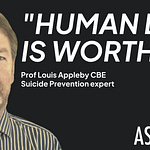





Share this post